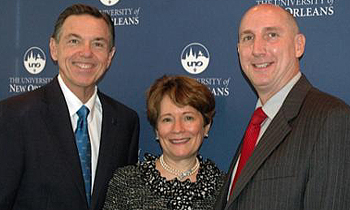Nice Above Fold - Page 500
WGBH taps into Olympic spirit with new online doc project
An online-only documentary project from WGBH is channeling the Olympic spirit toward a major sporting event that receives scant media coverage yet is of great interest to under-served audiences.WGBH widens radio reach with PRI acquisition
WGBH’s acquisition of Public Radio International, announced July 26, positions the station and network to step up their longtime collaboration as co-producers.. PRI will remain operationally independent ... and be responsible for raising its own revenue...NPR receives $1.5 million grant to support race and ethnicity reporting
...Like Planet Money, the as-yet-unnamed unit will establish its brand on multiple platforms, through reports for NPR’s radio shows, a blog and other facets...
Pacifica budget cuts delayed
Leaders of the Pacifica Foundation will seek a new executive director and are asking stations for financial information before ordering across-the-board cuts pushed by current Executive Director Arlene Engelhardt.Detroit PTV to lead nationwide dialogue on Arab-Americans, funded by Kellogg Foundation
Detroit Public TV has received a $250,000 grant from the W.K. Kellogg Foundation for a national program increasing public understanding of the Arab-American community. The project builds on the station’s 13-part series, Arab-American Stories. For the initiative, “Arab-American Stories — A National Dialogue,” Detroit PTV will partner with PBS member stations, libraries and community centers to host forums. The station worked with the Arab American Institute in Washington, D.C., to identify library systems in the top Arab-American populated communities nationwide, which include Boston, Houston, Los Angeles and Miami. The station also plans a website and curriculum for middle- and high-school students.If ratings don’t correlate to dollars at pledge time, what will?
PBS began mining national Nielsen data for pledge-drive audience insights in 2009, but it hasn't learned what to do about declining pledge ratings.
University regents call time-out on KUT signal expansion
One of public radio’s biggest split-format stations, Austin’s KUT, is pursuing a signal expansion that follows a familiar playbook for strengthening audience service: buying a new channel to air music while dedicating its flagship signal to news programming. But for this station serving a city that makes weirdness a point of civic pride, there’s a distinct difference to its ambitions to become a dual-station operator. It will put rock and alternative music, not classical, on its new signal; 90.7 MHz, the FM channel that has served KUT’s news and music audiences for decades, will go all-news. That’s if and when the University of Texas Board of Regents, the governing board of KUT’s licensee, approves the proposed $6 million purchase of 98.9 MHz, a commercial frequency that’s now broadcasting classic rock hits under the call letters KXBT.Aronson promoted at Frontline, NPR Board elections, Lapin joins Current, and more...
The promotion, announced during the Television Critics Association Press Tour last month, was widely reported as an indication that Aronson will succeed founding Executive Producer David Fanning atop PBS’s investigative news centerpiece.WWNO, NPR plan expanded newsroom to serve New Orleans
A group of public radio partners is preparing to launch a new local journalism nonprofit that will employ upwards of 20 people in a hybrid digital/broadcast newsroom.Thicket of uncertainty for federal aid
Public broadcasters face multiple and serious uncertainties on Capitol Hill over the next few months. A spending bill approved by the House subcommittee with oversight of CPB’s appropriation proposes to phase out CPB funding over the next three years; it includes language restricting public radio stations from spending their CPB aid to support NPR in any way. Another election-season threat comes from GOP presidential hopeful Mitt Romney, who has repeatedly cited CPB as one of five agencies he’d extinguish. Sequestration, a byproduct of Congress’s inability to reach consensus on debt-reduction measures last summer, could also hit pubcasting, slicing 8 percent or more from the $445 million in federal funding that pubcasters anticipate for 2013.Daisey, onstage and off air, revives his 'Agony and Ecstasy'
“There is no objective, journalistic version of the show,” Daisey said. “I will be, always, making constant lies of omission by leaving out tons and tons and reams and reams of details."WNET to share content with city's NYC Media
WNET in New York City is collaborating with NYC Media, part of the Mayor’s Office of Media and Entertainment, to share content “highlighting different aspects of the city,” the two said in a press release. The partnership “allows us to mine our incredible archives for new platforms,” said Neal Shapiro, WNET president. First up, the NYC life channel will broadcast episodes of WNET’s Treasures of New York and MetroFocus, and WNET and WLIW will run NYC life’s special about city parks.Birmingham News calls on Alabama governor to investigate upheaval at APT
In an editorial today, the Birmingham News is asking Alabama Gov. Robert Bentley and legislative leaders to “get to the root cause” of the “continuing upheaval” at Alabama Public Television. “APT and its educational and informative programming are too important to the state not to warrant an investigation into what is going on with the commission that oversees it,” the editorial board wrote Monday. The sudden termination on June 12 of APT Executive Director Allan Pizzato and his deputy, Pauline Howland, by the Alabama Educational Television Commission threw the state network into chaos. Within days, nine members of two fundraising boards resigned in protest; the station’s longtime chief operating officer, Charles Grantham, also just resigned, effective Aug.Pledge Pipeline 2012-13
Current’s Pledge Pipeline previews 17 shows heading to public TV on-air membership drives in December 2012 and March 2013.CPB grants NPR $1.5 million for diversity initiative
CPB is providing a $1.5 million grant to NPR to increase the diversity of its journalism ranks. The announcement of the two-year grant came on Aug. 2 the UNITY 2012 Convention in Las Vegas, an annual gathering of media professionals. The funding will help NPR create a diverse team of reporters and editors guided by a senior online journalist overseeing the creation and curation of original, multiplatform content daily. The team will provide coverage of local communities nationwide, the issues that affect them and the people of many backgrounds and opinions who make those communities unique. CPB said this grant builds on the success of the CPB/Knight Foundation-funded Project Argo, which helped NPR serve new broadcast and online audiences by focusing on specific subject areas.
Featured Jobs









